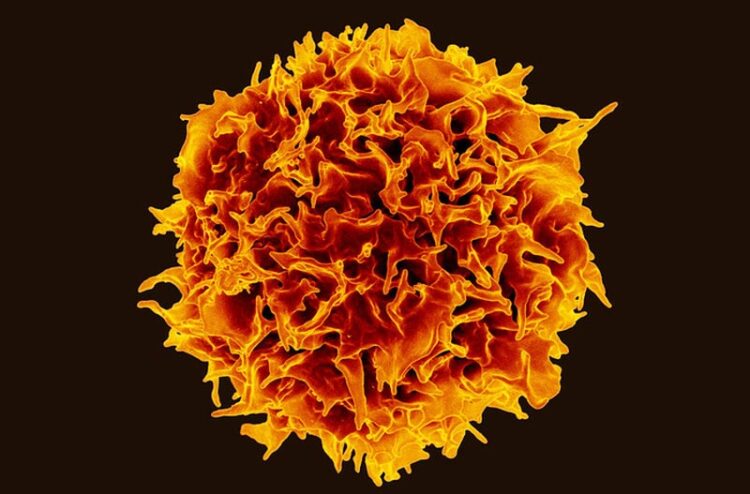New details on rare immune disease

Colorized scanning electron micrograph of a CD4+ T-cell
Credit: NIAID
Idiopathic CD4 lymphocytopenia leaves immune system vulnerable to other diseases, cancers.
In an 11-year study, researchers at the National Institutes of Health have further characterized idiopathic CD4 lymphocytopenia (ICL), a rare immune deficiency that leaves people vulnerable to infectious diseases, autoimmune diseases and cancers. Researchers observed that people with the most severe cases of ICL had the highest risk of acquiring or developing several of the diseases associated with this immune deficiency. This study, published in the New England Journal of Medicine, was led by Irini Sereti M.D., M.H.S. and Andrea Lisco, M.D., Ph.D. of the HIV Pathogenesis Section in the Laboratory of Immunoregulation at the National Institute of Allergy and Infectious Diseases (NIAID), part of NIH, and conducted at the NIH Clinical Center.
ICL is a condition marked by too few CD4+ T-cells, which are a type of white blood cell. The clinical definition of ICL is a CD4+ T-cell count of less than 300 cells per cubic millimeter (mm³) of blood for at least six weeks, in the absence of any disease or therapy associated with reduced white blood cells. Unlike HIV, a virus that suppresses the immune system if left untreated, there is no evidence that ICL is transmitted from person to person, and it has no known cause. There are limited therapeutic options for ICL.
In this observational study, the NIAID researchers quantified immune cells and noted the presence of opportunistic infections—infections that typically only affect people with suppressed immune systems—and other clinical conditions among 91 participant volunteers with ICL. The most prevalent opportunistic infections were human papillomavirus-related diseases (in 29% of participants), cryptococcosis (24%), molluscum contagiosum (9%), and mycobacterial diseases other than tuberculosis (5%). Participants with CD4+ T-cell counts below 100 cells per mm³ had a more than five-fold higher risk of opportunistic infections than those with CD4+ T-cell counts above 100 cells. Cancer risk was also higher in individuals with the lowest CD4+ T-cell counts, but the risk of autoimmune disease was lower.
These findings further support the inverse correlation between CD4+ T-cell count and susceptibility to viral, fungal, and mycobacterial infections, as well as certain cancers, according to the authors. NIAID continues to pursue research on the natural history of rare conditions such as ICL to understand disease progression, as well as potential therapeutic interventions.
ARTICLE:
A Lisco et al. Reappraisal of Idiopathic CD4 Lymphocytopenia at 30 Years. New England Journal of Medicine DOI: 10.1056/NEJMoa2202348 (2023).
WHO:
Andrea Lisco, M.D., Ph.D., assistant clinical investigator in the HIV Pathogenesis Section of NIAID’s Laboratory of Immunoregulation, and Irini Sereti, M.D., M.H.S., chief of the HIV Pathogenesis section, are available to discuss this research.
CONTACT:
To schedule interviews, please contact the NIAID News & Science Writing Branch, (301) 402-1663, NIAIDNews@niaid.nih.gov.
NIAID conducts and supports research—at NIH, throughout the United States, and worldwide—to study the causes of infectious and immune-mediated diseases, and to develop better means of preventing, diagnosing and treating these illnesses. News releases, fact sheets and other NIAID-related materials are available on the NIAID website.
About the National Institutes of Health (NIH): NIH, the nation’s medical research agency, includes 27 Institutes and Centers and is a component of the U.S. Department of Health and Human Services. NIH is the primary federal agency conducting and supporting basic, clinical, and translational medical research, and is investigating the causes, treatments, and cures for both common and rare diseases. For more information about NIH and its programs, visit http://www.nih.gov/.
NIH…Turning Discovery Into Health®
Journal: New England Journal of Medicine
DOI: 10.1056/NEJMoa2202348
Media Contact
NIAID News & Science Writing Branch
National Institute of Allergy and Infectious Diseases
NIAIDNews@niaid.nih.gov
Office: (301) 402-1663
Media Contact
All latest news from the category: Life Sciences and Chemistry
Articles and reports from the Life Sciences and chemistry area deal with applied and basic research into modern biology, chemistry and human medicine.
Valuable information can be found on a range of life sciences fields including bacteriology, biochemistry, bionics, bioinformatics, biophysics, biotechnology, genetics, geobotany, human biology, marine biology, microbiology, molecular biology, cellular biology, zoology, bioinorganic chemistry, microchemistry and environmental chemistry.
Newest articles

Innovative 3D printed scaffolds offer new hope for bone healing
Researchers at the Institute for Bioengineering of Catalonia have developed novel 3D printed PLA-CaP scaffolds that promote blood vessel formation, ensuring better healing and regeneration of bone tissue. Bone is…

The surprising role of gut infection in Alzheimer’s disease
ASU- and Banner Alzheimer’s Institute-led study implicates link between a common virus and the disease, which travels from the gut to the brain and may be a target for antiviral…

Molecular gardening: New enzymes discovered for protein modification pruning
How deubiquitinases USP53 and USP54 cleave long polyubiquitin chains and how the former is linked to liver disease in children. Deubiquitinases (DUBs) are enzymes used by cells to trim protein…



